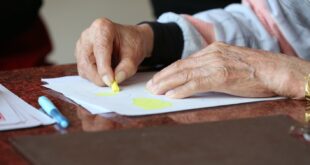Article by Elaine Smith.
Some assume that Alzheimer's disease merely affects the memory of a person. This can be true, but only in the early stages of the disease. In the case of Auguste Deter in 1901, the first person to be diagnosed, her symptoms began lightly, and only gradually did it begin to take its toll. Admitted into a mental institution, she was treated by Dr. Alois Alzheimer, who treated her with several tests. At first memory loss seemed the only culprit. But in time her condition grew worse. Overtaking her entire brain, it seemed Auguste Deter had lost any ability to function on her own will.
This tragedy of Alzheimer's amounts to a person's inability to remain themselves. It is enough for a disease to take a person's life; it is another for it to shatter their sense of self.
In light of this colossal toll, a variety of methods exist to keep the disease at bay. One of the common conceptions of preventative measures remains to engage in social activities. Several studies and theories reveal that people who do not regularly socialize, or do not, in some way, engage in reciprocity, are more susceptible to an early onset of Alzheimer's. So those who ritually remain in solitude, who give their brains very little new information to process, should make the effort to "exercise" their frontal lobes. The point here is stimulation of the brain; and any activity not rote and preordained should in turn be stimulating.
Intellectual challenges may be the most refined way to stimulate the lobes of your brain. This kind of "agitation" can be seen as a physical message. It works out all the kinks. But don't confuse stimulation with frustration, as stress can make matters worse. Intellectual pursuits such as mathematics or even a simple crossword puzzle, performed daily, can work wonders on the mind of a senior citizen. This intellectual activity is merely an offshoot of social activity, designed to present new challenges to the physical prowess of the human brain, and to never allow it to grow bored and slack, like a malfunctioning couch potato. Since some folks out there consider the word "intellectual" to be frightening, manoeuvre around the matter to fit the lifestyle. From computers or, to the computer-illiterate, pick-up-and-play peripherals like the Nintendo DS, intellectual stimulation can be as accessible as channel surfing, and twice as fun.
Omega-3 fatty acids have been shown, though as of yet unproven, to reduce the risk of Alzheimer's disease. This happens because DHA, a fatty acid present in Omega-3, reputedly interrupts the formation of tau, a protein that causes complications in the fibres of the brain, thereby being one of the two catalysts that lead to Alzheimer's. This can only be seen as a preventative measure or as therapy to slow down the disease. It is in no way a cure. And so a diet primarily made up of fish, as seafood tends to be fortified with Omega-3, as well as eggs, is a sure way to start the day.
Of course, a fortified diet and stimulation of the brain should be general practice for anybody. But in the fight against Alzheimer's, it can turn out to be a lifesaver in the effort to save one's sense of self.









Sailor - 16 years ago
Useful information and appears to be realistic advice about omega 3. First time I have read an uncluttered account about Alzheimers with some hints on prevention. Like evry other bit of the body if you don’t use it you will lose it. So exercise body and mind is the message